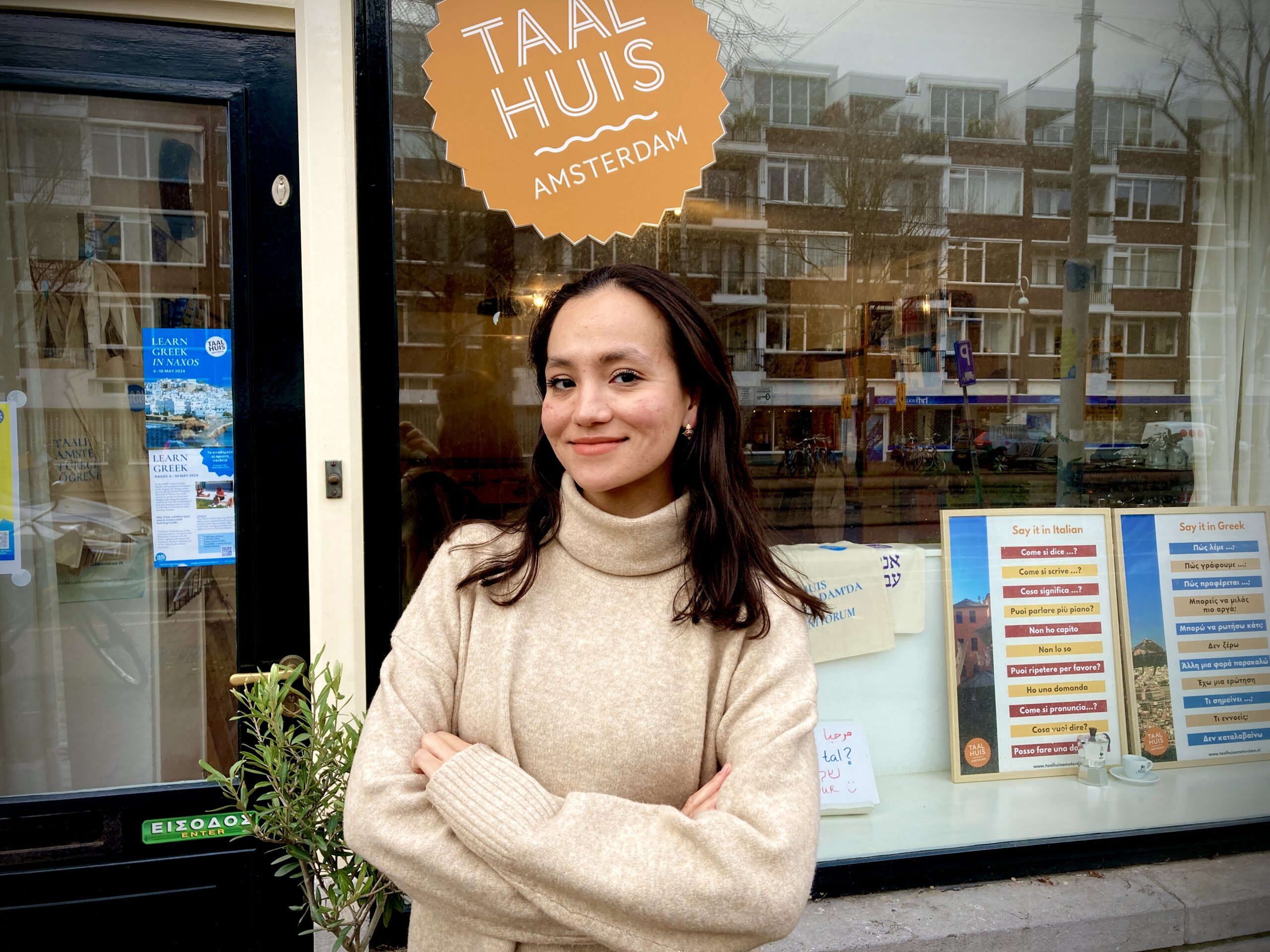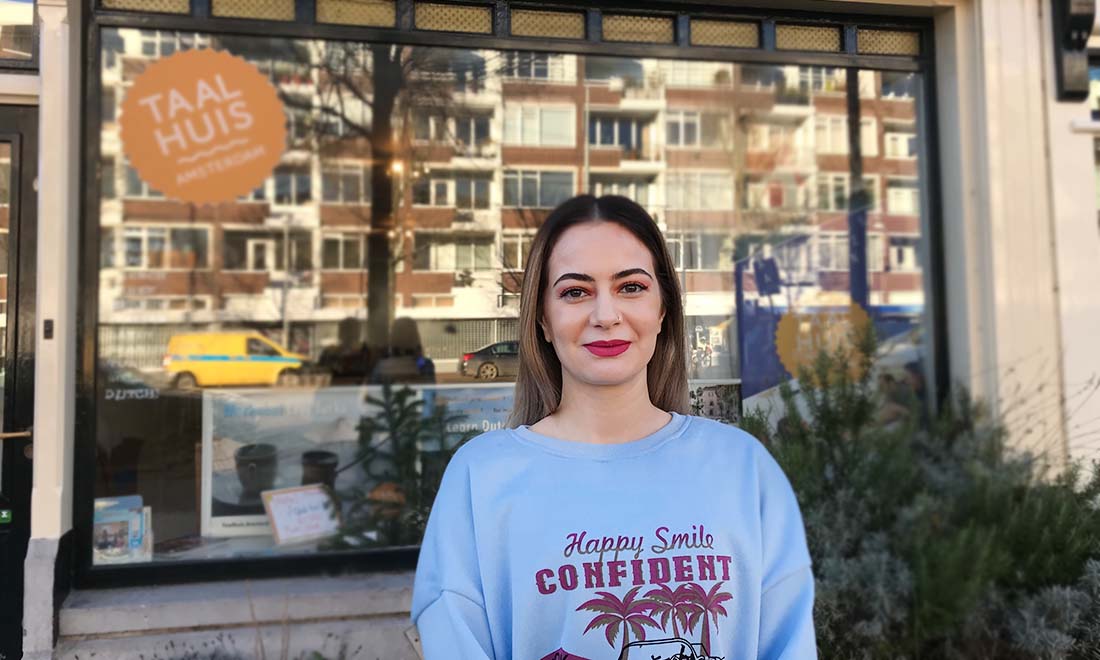During each course period, Taalhuis Amsterdam reserves a handful of free spots in the Dutch courses for undocumented refugees, in collaboration with ASKV-Steunpunt Vluchtelingen, among others. The costs are partially covered by students who choose to donate something extra on top of their own course fee.
Thanks to these donations, many people have been learning and improving their Dutch. Like Ayna Matiyeva (27) from Turkmenistan, who has been living in the Netherlands since May 2023. She is a human rights activist and has worked as a translator, interpreter and language teacher. So it’s not a big surprise that she speaks a lot of languages: in addition to Turkmen, also Russian, Arabic, Turkish and English. And now she is learning Dutch, in Tessa and Ella‘s A1.2 group.
We spoke to her about her activities and how she feels about learning Dutch. A1.2 may be one of the beginner levels, but that does not alter the fact that she did this interview entirely in Dutch.
Hi Ayna! You also teach English yourself. Where and to whom?
On the ship I live on [the cruise ship MS Galaxy], to women from countries such as Turkey and Somalia, but also from other countries in the former Soviet Union, such as Tajikistan, Kyrgyzstan and Uzbekistan. And from Turkmenistan, which quite surprised me, because not many people from Turkmenistan go to Europe. My parents still live there, but I haven’t spoken to them in a year.
Why not?
They don’t have access to the free internet, and I think they are also afraid to have contact with me because I am against the dictatorship. I also write about that on my website, and have made a documentary about it too.
A documentary? How come?
Last year I took a filmmaking course with my husband. I’ve been talking to other people from Turkmenistan about the country’s politics and culture, and my husband will be editing it. In the summer we also made a video about freedom. I already knew this word in Arabic, Russian, Turkmen and Turkish, but not yet in Dutch. ‘Vrijheid’ thus became my first word in Dutch.
When can we see this video about Turkmenistan?
Early next year.
How come you speak all those languages?
I used to go to a Russian school, and we always spoke that at home. When I was five or six years old I also watched Turkish cartoons; I could understand it a bit, and now I have a Turkish husband, so I speak it too. I had Arabic at university as a second language. I also had English at school, and because my sister lives in the United States, I spoke it a lot with her. I actually don’t speak Turkmen very well anymore, because I hardly ever use it.
Isn’t Turkmen your native language?
Yes, the first language of Turkmenistan is Turkmen, and the second is Russian. But I mainly grew up speaking Russian; my mother is a doctor, and everyone at her work speaks it. In my own city there are people from Russia, Armenia, Azerbaijan, and they all speak Russian. But if it were up to former president Gurbanguly Berdimuhamedow, everyone would only speak Turkmen.
Some people find learning Dutch very difficult, but I think Russian is harder. It was okay for me because I learned it as a child. Last year I also taught Russian in Belarus, for example to people from Turkmenistan and Germany, and I worked at a language school. I also taught Arabic, Turkish and English. I enjoy helping people.
What’s so difficult about Russian?
Words change endings if you use them in a different case: for example, the word ‘car’ is mashina (машина), but if you want to say ‘I want a car’ you have to use the accusative, or ya hochu mashinu (я хочу машину ). And ‘backpack’ is ryukzak (рюкзак), but ‘I don’t have a backpack’ is u menya net ryukzaka (у меня нет рюкзака), because it is the genitive.
I would like to do some research into the relationship between Russian and Dutch words. Many Dutch words are very similar to Russian ones, such as bibliotheek (library, biblioteka, библиотека) or apotheek (pharmacy, apteka, аптека), but also kantoor (office, kontóra, контора). And rugzak is ryukzak (backpack, рюкзак), but ‘back’ is spina (спина), so I don’t know how that happened.
Last year I also looked at the relationship between Turkish and Arabic, and many Turkish words actually come from Arabic. For example, merhaba (‘hello’) comes from marhaban, and teşekkürler (‘thank you’) from tašakkur.
So Dutch is not that difficult?
It’s not a piece of cake, but it is doable. I have to work hard for it and always listen carefully. To conversations, but also to TV and videos, such as on YouTube. For example, I watch Dutch with Aina, who is from Russia, and Learn Dutch with Kim. Next year I really want to speak Dutch well; I want to take the integration exam in the summer.
You’re doing a great job so far, I must say!
Thank you! But the mentality here is also good, very different from, for example, Belarus. There teachers would say things like: ‘You’re not smart.’ I learn a lot from Ella and Tessa, but it is also a pleasant atmosphere. With Ella we always formulate questions ourselves, which we then ask each other, and we listen to songs with gaps in the lyrics. Tessa also has useful games to memorize words. I am very grateful to be able to do this course, so to all donors who make it possible to learn Dutch at Taalhuis Amsterdam: thank you!
Interview by Dutch teacher Yoran.


